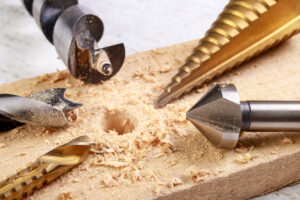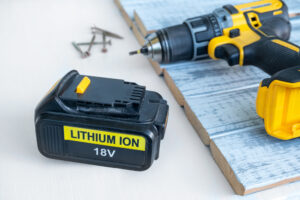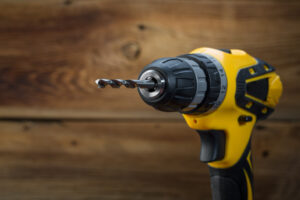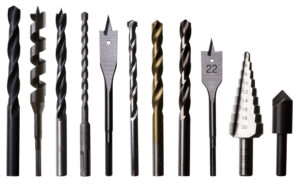
When it comes to choosing the right drill for your projects, it’s important to consider the differences between cordless and corded drills. Cordless drills offer portability and convenience, while corded drills provide continuous power and higher levels of strength. Each type has its advantages and disadvantages, so let’s explore the pros and cons of both to help you make an informed decision.
Key Takeaways:
- Cordless drills are portable and convenient, running on rechargeable batteries.
- Corded drills require a power outlet and offer a continuous power supply, making them more powerful and reliable.
- Cordless drills are better suited for small tasks and DIY projects, while corded drills are ideal for professional use and heavy-duty tasks.
- Consider your specific needs, such as power requirements and mobility, when choosing between cordless and corded drills.
- Ultimately, the decision depends on your preferences and the type of work you will be doing.
Advantages and Disadvantages of Corded Drills
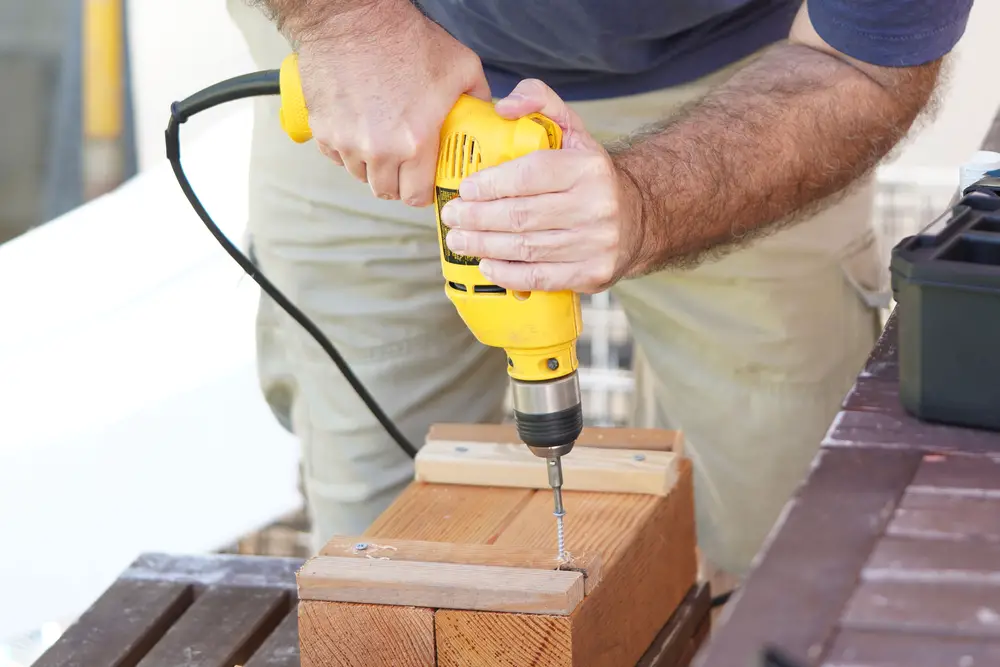
When it comes to drilling power, corded drills have a clear advantage. These drills pack more power and offer consistent torque, making them ideal for heavy-duty drilling tasks. The increased power allows for faster drilling speeds and the ability to tackle tough materials with ease.
Corded drills also provide reliable drilling and driving action, ensuring precision and accuracy in your work. Their lighter and more compact design makes them easy to maneuver, allowing for better control and less fatigue during extended use.
However, corded drills come with their own set of disadvantages. One of the major drawbacks is their reliance on a power outlet. Unlike cordless drills, which are battery-powered and provide mobility, corded drills must be plugged into a power source at all times. This limits their portability and restricts their use to areas with access to electricity.
Furthermore, the cords of corded drills can become a tripping hazard if not properly managed. The long power cords can get tangled or accidentally pull the drill off balance, posing a safety risk. It’s essential to take precautions and keep the cord organized to avoid accidents.
| Advantages of Corded Drills | Disadvantages of Corded Drills |
|---|---|
|
|
Considering these advantages and disadvantages, corded drills are well-suited for professionals and those who require maximum power and reliability. They are excellent for heavy-duty applications and projects where continuous power is essential. However, if mobility and portability are a priority, corded drills may not be the most convenient option.
Advantages and Disadvantages of Cordless Drills
These tools offer a great deal of convenience and portability, making them a popular choice among both professionals and DIY enthusiasts. Let’s take a closer look at the advantages and disadvantages of cordless drills.
Advantages of Cordless Drills
- Portability: Cordless drills can be taken anywhere, allowing you to work in different locations without being limited by power outlets. This makes them ideal for projects that require mobility or when working in remote areas.
- Convenience: With a cordless drill, you don’t have to worry about untangling cords or finding a nearby power source. They offer hassle-free operation and allow for quick and easy setup.
- Rechargeable Batteries: Cordless drills come with rechargeable batteries, which eliminates the need for constantly buying disposable batteries. This not only saves you money in the long run but also contributes to a more sustainable environment.
- Hard-to-Reach Areas: Cordless drills are excellent for drilling in tight spaces or areas where there is limited accessibility. The absence of cords provides flexibility and allows for better maneuverability.
Disadvantages of Cordless Drills
- Lower Power Levels: Compared to their corded counterparts, cordless drills generally have lower power levels. This might make them less suitable for heavy-duty tasks that require a significant amount of power.
- Less Consistent Delivery: Cordless drills may experience fluctuations in power delivery as the battery charge depletes. This can affect the overall performance and efficiency of the tool.
- Battery Life and Recharge Time: Cordless drills rely on batteries, which can deplete during extended use. This may require you to wait for the battery to recharge or have spare batteries on hand to continue working. Additionally, some batteries may take a considerable amount of time to recharge fully.
- Heavier Weight: Cordless drills are generally heavier than corded drills due to the built-in battery. This added weight may cause fatigue and discomfort during prolonged use.
It’s important to carefully consider your specific needs and preferences when deciding between a cordless or corded drill. Take into account the power requirements of your projects, the level of mobility you require, and the types of materials you will be working with.

Corded vs. Cordless Drills – Which is Right for You?
Each option has its own strengths and weaknesses, so it’s crucial to evaluate your specific requirements and preferences. Let’s take a closer look at the key factors to help you make an informed decision.
Power and Reliability
- A corded drill provides a continuous power supply, making it the go-to choice for high-power and reliable performance. It’s ideal for heavy-duty tasks that require consistent torque and drilling power.
- On the other hand, cordless drills offer convenience and portability. They run on rechargeable batteries and provide sufficient power for DIY projects and smaller jobs. While they may not match the sheer power of corded drills, they are suitable for most common tasks.
Flexibility and Mobility
- If you need the flexibility to work in remote areas without access to power outlets, a cordless drill is the way to go. Its portability allows you to move freely and work in tight spaces, making it perfect for on-the-go tasks.
- However, if you prioritize a continuous power supply and don’t mind being tethered to a power outlet, a corded drill offers unrestricted drilling and driving action. It eliminates the need to recharge batteries and allows for extended use without interruptions.
Job Type and Durability
- Consider the nature of your projects. If you predominantly handle professional and heavy-duty tasks that demand maximum power and durability, a corded drill is the top choice. It excels in tough materials and demanding applications.
- For DIY enthusiasts and lighter tasks, a cordless drill provides ample power and longevity. While it may not withstand heavy use over extended periods, it is more than capable of tackling common household projects.
If you require continuous power, high torque, and reliable performance, a corded drill is the way to go. On the other hand, if you value portability, convenience, and the ability to work in remote areas, a cordless drill is a great choice.
Conclusion
Corded drills excel in situations where continuous power and high levels of power are required, making them the preferred choice for professionals and heavy-duty drilling tasks. On the other hand, cordless drills offer the convenience of portability, making them ideal for DIY projects and smaller jobs.
Consider the type of work you will be doing, the power requirements, and the level of mobility you need when making your decision. If you value the ability to work in remote areas without access to power outlets or are looking for a tool that can easily be carried around, a cordless drill is the way to go.
However, if you require continuous power supply and need a tool with higher power and reliability, a corded drill might be the better choice. Remember, both cordless and corded drills have their place in the world of power tools, and the right choice for you will depend on the specific requirements of your projects.
FAQ
What are the differences between cordless and corded drills?
Corded drills require a power outlet and offer a continuous power supply, while cordless drills run on rechargeable batteries and are portable.
What are the advantages of corded drills?
Corded drills offer higher power, more consistent torque, and reliable drilling and driving action. They are also lighter and more compact compared to cordless drills.
What are the disadvantages of corded drills?
Corded drills must be plugged into a power outlet at all times, which limits mobility. The cords can also create a tripping hazard.
What are the advantages of cordless drills?
Cordless drills are portable and convenient, can be taken anywhere as long as they have a full charge, and save money in the long run with rechargeable batteries. They are also better for hard-to-reach drilling jobs.
What are the disadvantages of cordless drills?
Cordless drills have lower power levels and less consistent delivery compared to corded drills. The batteries can deplete, requiring waiting time for recharging or using multiple batteries. Cordless drills are generally heavier than corded ones.
Which drill is right for me, corded or cordless?
The choice between corded and cordless drills depends on your specific needs and preferences. Corded drills are suitable for continuous power supply, high power, and reliability, while cordless drills offer portability, convenience, and the ability to work in remote areas without access to power outlets.
- Drill Battery Maintenance: Essential Tips for Cordless Drill Battery Care - February 5, 2024
- Troubleshooting Drill Issues - February 5, 2024
- Quick Drilling Techniques - February 2, 2024





